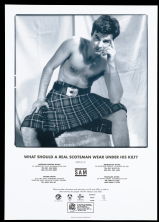Calendar
seminar: Dr Hannah J. Elizabeth (LSHTM) Recovering Women’s Experiences of HIV/AIDS and Sexual Health Activism in Edinburgh, 1983-2000
Presentation, refreshments, discussion. All are welcome.
While government interventions such as the ‘Don’t die of Ignorance’ campaign are often lauded as a brave and effective intervention which shifted the discourses around AIDS from a ‘gay disease’ to one affecting all sexually active publics, the needs of HIV-affected children and their families were woefully underserved by the government’s large scale public health education response. As the extent of AIDS’ effects on children became evermore stark, social workers scrambled for the funds, expertise and materials they needed to help and empower this underserved and varied group. Recognising the AIDS crisis in Edinburgh particularly affected women, social workers began to seek the voices of HIV-affected mothers and children, in an attempt to produce texts and protocols which bridged these gaps. The aim of these texts was to foster agency and lessen the emotional burden of HIV diagnosis and treatment. In addition to educational materials for the general public and HIV-affected women, new spaces were created to care for HIV-affected families such as hospices, community cafes and multi-use centres. This was interdisciplinary collaborative AIDS activism born out of the daily fight for resources, information, space and empathetic treatment.
Drawing on Edinburgh’s AIDS newsletters, social work manuals, testimony, education leaflets and the archival traces of hospices like Brenda House, this paper draws on the voices of the HIV-affected to tell the history of how this emerging crisis evolved in Edinburgh and was experienced by women from HIV-affected families and those that worked with them. By analysing representative social work texts, leaflets and posters, the paper captures how activism emerged as a response to the day-to-day challenges of living and working with HIV in Edinburgh. It argues that only through drawing on multiple sources of varied forms and from a variety of authors can we hope to trace the responsive nature of women’s AIDS activism in Edinburgh in this period.

